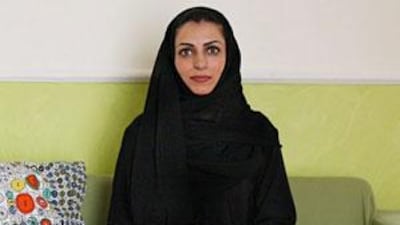Dubai // The sexual abuse of children, long a taboo subject, is being brought into the open. Starting today, the Dubai Foundation for Women and Children is launching a month-long Protect Childhood Campaign in schools, businesses and malls to speak with people about what they can do to protect those they love.
"Children are extremely vulnerable," said Afra al Basti, the foundation's chief executive officer. "If they are damaged through abuse in whatever form this may take, they will grow into troubled adults - something that has enormous implications in our community for years to come." There are no statistics for the number of children affected in the UAE, although the foundation says there appears to be a rise in cases of abused children. It is unclear whether that means there has been an increase in the number of victims, or merely an increase in the public's awareness of the problem.
"Sexual abuse can occur with a family member or a stranger," said Dr Azhar Abu Ali, the foundation's care and rehabilitation director. "The most common type we hear of is rape, but it also includes inappropriate touching, sexual harassment, or forcing someone to be exposed to inappropriate scenes." The effects of abuse can be lifelong. It can harm a person's health, professional growth and mental well-being.
"Sexual abuse can shake up a child's world," said Dr Abu Ali. "It can affect their sense of trust, their self-esteem, their perception of themselves. They can become extremely withdrawn or overly attached in an abnormal way. It causes health, social and academic symptoms." Most of the perpetrators of abuse are someone the child trusts, which can be confusing to the victims. The most vulnerable children are those between the ages of 8 and 12, although it can happen to a child of any age.
The foundation estimates that up to 40 per cent of abuse is carried out by relatives and another 50 per cent are abused by a trusted adult, such as a teacher. One in three abused children will keep their experience a secret and never reveal the incidents to anyone, ever. Because the children are often too young to understand what is going on, they often do not recognise that what is happening to them is sexual abuse. Many blame themselves.
"The first feeling a child has is the question: 'Is it my fault?' They feel like they made it happen. They think they should have done this or that to prevent it," said Dr Abu Ali. Even if children are able to work up the courage to tell someone, many families do not know how to deal with this type of problem. "This issue is taboo," said Dr Yousef Abou Allaban, a psychiatrist at the American Centre for Psychiatry and Neurology in Abu Dhabi.
"Most families don't know about it, and if they know they won't talk about it at all." He said shame often prevented families from getting the help they needed. Without assistance, many victims of abuse will develop life-long psychological problems, and studies have shown that child abuse can change the structure of a person's brain. "From my experience here I have found a lot of sexual abuse cases, people who were abused as children but who never addressed the issue," he said, suggesting the Government compile data about the number of people abused as children.
"If you don't know the extent of the problem, how will you utilise the resources to address it? It may turn out to be small, but it may also be much bigger than people think." This is the first awareness programme in the UAE designed to educate the public about how to protect their children from sexual abuse and its effects. The foundation hopes it will become an annual event and that each April will be devoted to protecting children.
"The country needs to collaborate in terms of organisations," said Ohood al Suwaidi, the foundation's communication director. "We can work with the police and the health authorities to get some statistics so we can see the level of the problem in the UAE." While preparing for the campaign, she said many older people asked her why it took so long for this to happen. "There must be a starting point," she said. "Someone must be the first to talk about it and break the taboo."
@Email:amcmeans@thenational.ae The foundation's hotline is 800111. SMS is 5111 and website is www.dfwac.ae

